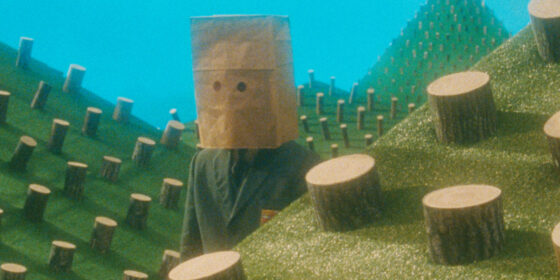The Twentieth Century (Matthew Rankin, Canada) — Midnight Madness

By Michael Sicinski
Hats off to Midnight Madness programmer Peter Kuplowsky for selecting this singular, albeit somewhat counterintuitive, homegrown oddity. Certainly a cult item in the making, The Twentieth Century represents the sort of Freudian-perverse take on national mythmaking that one finds in the work of Jim Finn, combined with the stark Futurist abstraction of Ericka Beckman. But there’s more than a touch of Guy Maddin running through this film’s DNA, from director Matthew Rankin’s adoption of grainy Super 8 and 16mm stocks and highly artificial colour tinting to his employment of a highly Expressionist theatrical style, complete with an appearance by Maddin regular Louis Negin as “Mother”—Winnipeggers of a feather, it seems, flock together.
But even if The Twentieth Century occasionally feels like the work of a really awesome cover band, there’s no denying that Rankin possesses his own sensibility in terms of exploring the meaning of official historiography. As with his earlier shorts Negativipeg (about a Burton Cummings pseudo-assault incident) and the recent The Tesla World Light (which concerns with the eponymous inventor’s cult-figure status), The Twentieth Century deals with dubious origins, paths untaken, and cultural definitions. A whimsical and twisted pseudo-biography of Prime Minister William Lyon Mackenzie King (Daniel Beirne) during his ignominious rise to power, the film depicts the man as a spineless mamma’s boy and shoe fetishist whose only qualification for political office appears to be his general inoffensiveness. (The series of candidates’ tests provide a wry compendium of Canadian stereotypes.)
In his mother’s visions, Mackenzie is fated to fall in love with an Aryan beauty (Catherine St-Laurent) who just happens to be the daughter of the bellicose Governor General (Séan Cullen). Rankin enfolds this pseudo-destiny into the overall fate of the nation, whether it will be ruled by English imperialism orQuébécois free love. But in the end, Rankin’s real target seems to be the “great man” theory of history: The Twentieth Century posits, quite unconvincingly, that the entire direction of the nation-state hinges on the actions of one scrawny little onanist who wouldn’t know statesmanship if it went off like a fire alarm in his trousers. O, Canada…
Michael Sicinski

